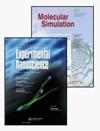Molecular dynamics study on friction of polymer material polyamide 6 (PA 6)
IF 2
4区 化学
Q4 CHEMISTRY, PHYSICAL
引用次数: 0
Abstract
ABSTRACTThe resin material PA6 has a wide range of application in engineering due to its excellent mechanical properties. The friction behaviour of PA 6 was studied using molecular dynamics simulation method in this study. The effects of temperature, sliding speed and wear depth on the friction performance of PA6 were studied, and the surface micromorphology of PA 6 model also was analysed. The main conclusions are as follows: Within the temperature range selected in this experiment, the temperature has no significant influence on friction and surface micromorphology of PA6. As the friction speed decreases, the friction decreases slightly. The coefficient of friction increases slightly with the increase of friction speed. The greater the wear depth is, the more pronounced the ploughing and debris accumulation on the surface of PA6 is. The friction coefficient increases slightly with the increase of wear depth, but not significantly. The greater the wear depth is, the larger the friction fluctuation is.KEYWORDS: Molecular dynamics simulationPA6frictionslidingtemperature Disclosure statementNo potential conflict of interest was reported by the author(s).高分子材料聚酰胺6 (pa6)摩擦的分子动力学研究
摘要树脂材料PA6因其优异的力学性能在工程上有着广泛的应用。本文采用分子动力学模拟方法研究了pa6的摩擦行为。研究了温度、滑动速度和磨损深度对PA6摩擦性能的影响,并分析了PA6模型的表面微观形貌。主要结论如下:在本实验选择的温度范围内,温度对PA6的摩擦和表面微观形貌没有显著影响。随着摩擦速度的减小,摩擦力略有减小。随着摩擦速度的增加,摩擦系数略有增加。磨损深度越大,PA6表面的犁耕和碎屑堆积越明显。随着磨损深度的增加,摩擦系数略有增加,但不显著。磨损深度越大,摩擦波动越大。关键词:分子动力学模拟pa6摩擦滑动温度披露声明作者未报告潜在利益冲突。
本文章由计算机程序翻译,如有差异,请以英文原文为准。
求助全文
约1分钟内获得全文
求助全文
来源期刊

Molecular Simulation
化学-物理:原子、分子和化学物理
CiteScore
3.80
自引率
9.50%
发文量
128
审稿时长
3.1 months
期刊介绍:
Molecular Simulation covers all aspects of research related to, or of importance to, molecular modelling and simulation.
Molecular Simulation brings together the most significant papers concerned with applications of simulation methods, and original contributions to the development of simulation methodology from biology, biochemistry, chemistry, engineering, materials science, medicine and physics.
The aim is to provide a forum in which cross fertilization between application areas, methodologies, disciplines, as well as academic and industrial researchers can take place and new developments can be encouraged.
Molecular Simulation is of interest to all researchers using or developing simulation methods based on statistical mechanics/quantum mechanics. This includes molecular dynamics (MD, AIMD), Monte Carlo, ab initio methods related to simulation, multiscale and coarse graining methods.
 求助内容:
求助内容: 应助结果提醒方式:
应助结果提醒方式:


